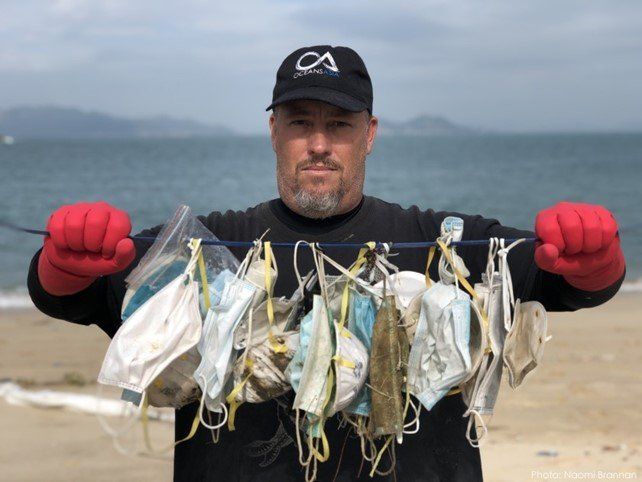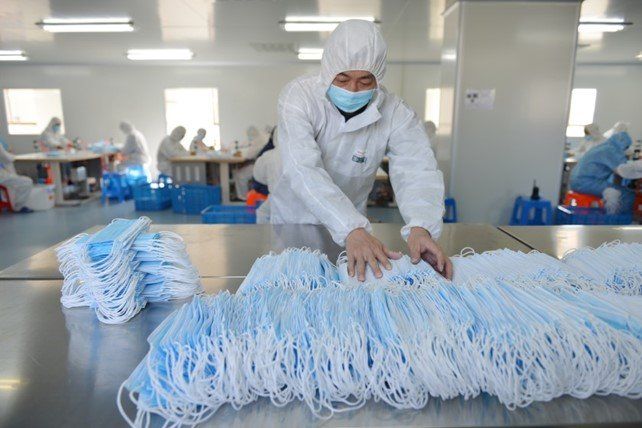Covid-19 Plastic: Protector or Polluter?
The amount of plastic waste in our oceans is surging due to the Coronavirus. Our natural environment is being hugely impacted by the pandemic, but the consequences have been overshadowed by the more urgent health concerns. The increased production and consumption of single-use plastics across the world has given rise to a new environmental challenge, adding to the vast plastic waste in the marine environment. Discarded masks, gloves and takeaway containers are washing up on shorelines around the world and littering the seabed (Zambrano-Monserrate, M et al., 2020).
Marine plastic pollution is a complex, multi-faceted problem and the onset of a pandemic has only made it more complicated. It is already globally accepted that plastic pollution is one of the largest threats that our oceans face today, and by 2050 there could be more plastic in the oceans (by weight) than fish! Every year millions of tonnes of plastic flows from rivers into the sea, polluting valuable ecosystems and getting into the food chain. Rivers are the arteries that carry the plastic from land to sea, so the problem needs to be addressed at the source - on land. In the past few months, the use of single-use plastics has increased significantly, particularly the use of PPE (personal protective equipment), which is used to protect those who are working on the front line. This widespread use of plastic throughout the world has created massive downstream waste disposal problems, and a lot of that is now being seen in the oceans and washed up on beaches.
It is important to acknowledge that we are living though an uncertain and unfamiliar time. Governments, businesses, and individuals alike have had to make changes to consumption behaviours for the safety and well being of everyone. No one knows what the safest option is, but a lot of people have reverted back to using more plastic as they feel it is the safer, cleaner, and more convenient option. After years of successful campaigning, plastic has now come back into our lives in large quantities! Industries have seized the opportunity to repeal disposable bag bans, meaning that companies that once encouraged consumers to bring their own bags have increasingly switched back to single-use packaging. In lots of places there have also been temporary bans on the use of reusable coffee cups, and on top of that, takeaway food and plastic water bottle sales have increased. The worry is that if the temporary relaxation to plastic bans become permanent, it could undermine efforts to reduce single-use plastics and increase ocean plastic pollution going forward.
While plastics such as gloves, masks and other medical equipment are important for protecting front line workers, this pandemic is a reminder of how much waste we produce and how important correct management of it is. Controlling this increase in single-use plastic waste will be a challenge for governments – even more so in many developing nations, where mismanaged waste commonly aggregates in towns, leaks into rivers and then flow into oceans. Waste recycling has always been a major environmental problem of interest to all countries. Recycling is a common and effective way to prevent pollution, save energy, and conserve natural resources. To make matters worse, as a result of the pandemic, some cities have suspended recycling programs, as authorities have been concerned about the risk of Covid19 spreading in recycling centres.
The health of the public is the priority, but it does not need to come at a cost to our oceans. This sudden increase in plastic needs to be tackled and addressed by governments and policy makers. A sustainable recovery is important to prevent similar occurrences from happening again in the future when we are faced with a global crisis. Good infrastructure and waste collection needs to be implemented globally, but also a focus on educating people and the role they can play to help. Single use plastics will have a long term impact on the marine environment, so countries should start acting now to stop more pollution from entering the oceans and reduce the negative consequences we will undoubtedly see.
References:
Zambrano-Monserrate, M., Ruano, M., Sanchez-Alcalde, L. 2020. Indirect effects of COVID-19 on the environment. Science of the Total Environment 728.SHARE THIS ARTICLE















